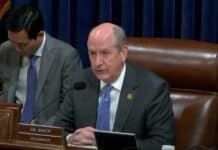With less than two weeks remaining in what DFL leaders said would be a relatively politically quiet legislative session, the 2024 non-budget year in the Minnesota House and Senate has been anything but.
As a $985 million DFL-sponsored bonding package begins working its way through both chambers in the closing days before the May 20 deadline, a number of controversial proposals Democrats introduced as standalone bills earlier in session have been tucked in omnibus bills. The fate of those provisions are being meted out by several bipartisan conference committees meeting this week.
Here’s a status update on a few of those pieces of legislation Alpha News has been tracking.
Eliminating belief-based vaccine exemptions for children enrolled in daycare
On Friday the Senate passed a health and human services omnibus finance bill that appropriates more than $83 million in supplemental spending (on top of last year’s $1.1 billion HHS legislation) and includes several highly-partisan policy provisions Republicans have opposed.
One of those provisions was authored by Sen. Liz Boldon, DFL-Rochester, that would effectively eliminate “conscientiously held beliefs” as a protected immunization exemption that private daycare providers are required to honor under current state law.
Boldon, a registered nurse employed by Mayo Clinic, presented the legislation as a standalone bill, SF610, in February. Following testimony from several members of the public, and debate among legislators, Health and Human Services Committee Chair Sen. Melissa Wiklund, DFL-Bloomington, had said she would bring the bill back for additional discussion at a later date, but never did. Instead, the bill was added to the HHS omnibus bill.
Minnesota statutes covering immunization exemptions currently treat private childcare centers similar to public schools, where conscientiously held beliefs are statutorily protected.
The bill “seeks to allow a specific group of independent businesses — licensed childcare providers — the choice to make policy around immunizations only involving the last exemption, personal beliefs,” Boldon said.
Beleaguered Sen. Nicole Mitchell, of Woodbury, was one of 34 DFL senators who voted to approve the omnibus bill that contains the elimination of the immunization exemption for children enrolled in daycares.
The House version of the omnibus health and human services finance bill does not include Boldon’s provision. So the fate of that legislation is likely to be determined in a conference committee that hasn’t yet been formed.
“Instead of looking at ways to increase affordability and quality of care, the Democrats have put forward a bill that gives child care providers the authority to mandate vaccines on children as young as two months old,” said Sen. Paul Utke, R-Park Rapids, the minority lead on the Senate HHS Committee.
Health insurers required to cover ‘gender-affirming care’ for minors
Also contained in the omnibus HHS finance bill that passed the Senate on Friday is a provision that would require health insurers to cover “gender-affirming care” for minors. That provision was included in a commerce bill that the state House approved last month.
Because that legislation was contained in two different bills in the House and Senate, survival of that provision in either bill will be left up to the fate of two conference committees, one of which will be meeting on Wednesday.
Election day pop-up polling places on college campuses
A conference committee charged with hammering out differences between Senate and House versions of an omnibus elections bill will decide whether to keep a provision that would mandate counties to provide pop-up style absentee voting locations on college and university campuses.
The House version of the omnibus bill includes that proposal, authored by Rep. Kristi Pursell, DFL-Northfield, which would, upon the request of any post-secondary institution, mandate county election officials to “establish an additional polling place for at least one day on the institution’s campus at a location that is agreed upon by the institution and the county auditor and that is accessible to the public.”
A handful of progressive activist organizations that represent student interests and elections reform are asking the conferees to keep that provision in the conference report.
“Prioritizing initiatives that expand voter access and addressing the barriers that many young people face when it comes time to vote is necessary for creating a thriving, functioning, and healthy democracy,” wrote Emma Rage, a representative for Minnesota-based Common Cause.
Republicans are blasting both the House and Senate version for lacking any bipartisan support.
“Democrat, single-party control has violated Minnesota’s historical tradition of bipartisan election law changes,” said Sen. Mark Koran, R-North Branch. “Their hyper-partisan bill degrades public trust and accountability. We should be focused on solutions that increase citizen transparency, integrity, and participation.”
School board vacancy
A new member of the legislature, Rep. Bianca Virnig, DFL-Rosemount, was able to get the first bill she’s authored since joining the state House in February added to an omnibus elections bill that is before a conference committee this week. HF4287 would expand the power of local school boards to appoint members to fill vacancies when a school board member resigns, as opposed to requiring a special election.
Virnig said her bill would allow boards to appoint a replacement without having to undergo a special election if under two years remain on the term.
In January, Virnig stepped down as a member of the Rosemount-Apple Valley-Eagan School Board after winning a special election for House District 52B. At the time, Virnig was only midway through serving a four-year term as a school board member for ISD 196.
The Rosemount-Apple Valley-Eagan School Board, which is controlled by Education Minnesota-endorsed members, appointed a replacement in February to fill the vacancy created by Virnig’s resignation. That seat, now occupied by Leah Gardner, is required by state law to undergo a special election this November.
The Minnesota School Boards Association, which represents already-elected school district officials across the state, is supporting the bill. But grassroots conservative organization Minnesota Parents Alliance says the provision would eliminate the voice of voters.
Ban on book bans
A conference committee appointed for an omnibus education policy bill approved tempered language last week to a provision promoted by Gov. Tim Walz that would impose a “ban on books bans” in school libraries.
The “book banning prohibited” provision passed by the Senate last month included language that would have required districts to place a licensed library media specialist in a position of sole authority for developing procedures for the selection and reconsideration of materials in school libraries.
That provision was deleted by conferees, after receiving criticism from Sen. Jim Abeler, of Anoka, and Rep. Peggy Bennett, of Albert Lea, both Republicans, who said that school boards need to retain authority on book challenges and selection processes. Instead, the final language requires each school district to create a book selection and challenge policy and then submit that policy to the Minnesota Department of Education.
Minimum wage increase indexed to inflation
A proposal that would allow the state commissioner of labor to increase the annual cap for raising the minimum wage to 5 percent, as indexed to inflation, is likely to make it out of a conference committee in the coming days. The provision was contained in both the House and Senate versions of an omnibus labor bill that passed both chambers last month.
The current cap is at 2.5 percent. The legislation also contains a provision that would eliminate exemptions for the size of employer as it relates to annual increases in the minimum wage.
The current minimum wage structure in state law distinguishes between “large” (annual gross revenues of at least $500,000) and “small” (annual gross revenues under $500,000) employers.
On Jan. 1, 2024, the minimum wage for large employers in Minnesota rose 26 cents from $10.59 to $10.85, and for small employers it increased 22 cents, from $8.63 to $8.85. The new provision eliminates that distinction.
Republicans have criticized the provision, saying that the decision to raise the minimum wage should reside with the authority of the legislature, and not an executive branch-appointed bureaucrat.
Hank Long
Hank Long is a journalism and communications professional whose writing career includes coverage of the Minnesota legislature, city and county governments and the commercial real estate industry. Hank received his undergraduate degree at the University of Minnesota, where he studied journalism, and his law degree at the University of St. Thomas. The Minnesota native lives in the Twin Cities with his wife and four children. His dream is to be around when the Vikings win the Super Bowl.

















